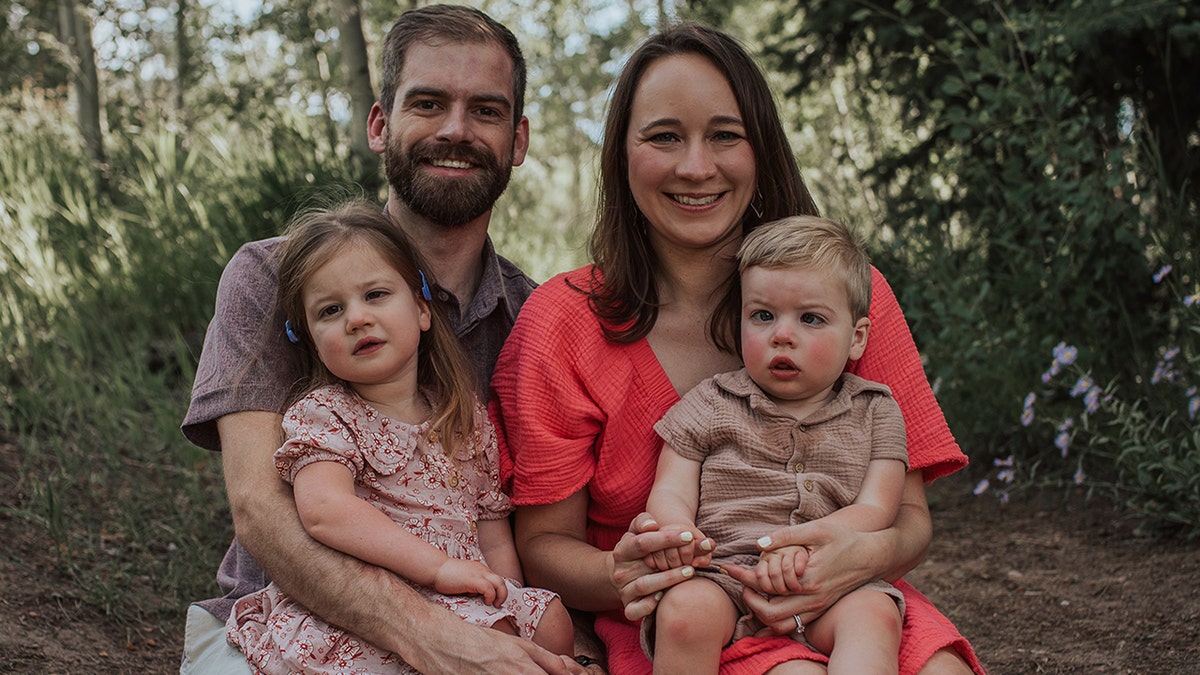NEWYou can now listen to Fox News articles!
Four American families are desperate to save their children from a devastating genetic disease. The cure exists — but it’s up to them to raise $1.15 million to fund a clinical trial.
Each of these families has a child with spastic paraplegia 50 (SPG50), a rare neurological disorder that affects fewer than 100 people in the world.
In an on-camera interview with Fox News Digital, the families spoke about their race against time to secure the treatment. (See the video at the top of the article.)
MOTHER FRANTIC TO SAVE CLINICAL TRIAL THAT COULD CURE HER DAUGHTER: ‘THE TREATMENT IS SITTING IN A FRIDGE’
The families’ goal is to raise $1.15 million by the end of October to start the trial in the U.S. They have set up a nonprofit organization called Jack’s Corner to assist with the fundraising efforts.
What is SPG50?
SPG50 slows down a child’s development, gradually leading to cognitive impairment, muscle weakness, speech impairment and eventually paralysis, according to the National Organization for Rare Disorders.

(Left to right) Naomi Lockard, Mila Wood, Cade Jobsis and Lincoln Medeiros have all been diagnosed with the genetic disease SPG50. (Lindsey Jane Photography; Erika Mills; Leah Serena Photography; Candice Jean Photography)
“The prognosis varies from person to person, but it’s generally a progressive condition,” Dr. Eve Elizabeth Penney, an epidemiologist at the Texas Department of State Health Services and medical contributor for Drugwatch, previously told Fox News Digital.
“Children with SPG50 may experience early developmental delays, muscle weakness and spasticity,” she went on. “Over time, the symptoms can worsen, making it hard for affected individuals to walk and perform daily activities.”
There is no treatment currently approved by the U.S. Food and Drug Administration (FDA) for SPG50. However, one does exist, thanks to Terry Pirovolakis, a father in Canada whose son was diagnosed in 2017.
FATHER CREATED A DRUG TO SAVE HIS SON FROM A RARE DISEASE, NOW OTHER FAMILIES ARE DESPERATE TO GET IT
“They told us to just go home and love him — and said he would be paralyzed from the waist down by age 10, and quadriplegic by age 20,” Pirovolakis told Fox News Digital of his son’s diagnosis. “They said he’d never walk or talk, and would need support for the rest of his life.”
Refusing to accept this outcome, Pirovolakis embarked on a mission to save his son — he liquidated his savings, met with numerous experts and paid scientists to create a gene therapy.

Emma and Dylan Jobsis, from Juneau, Alaska, have a 4-year-old son, Cade (pictured), who was also diagnosed with SPG50 in 2023. (Leah Serena Photography)
In March 2022, his son received the gene therapy and is now thriving. Pirovolakis then opened up a Phase 2 study in the U.S., which treated three more children. All have reported that the disease has stopped progressing and their cognition has improved.
Now, the goal is to move into a Phase 3 trial, which would allow more children to be treated — but because the drug is not yet FDA-approved, the families will need to raise the funds for the trial themselves.
Four families, one rare disease
Rebekah Lockard, from Littleton, Colorado, is desperate to treat her 4-year-old, Naomi, who was diagnosed with SPG50 in 2023.
Her younger child, Jack, was also diagnosed with SPG50 and received the therapy in a previous trial due to his younger age.

The Lockard family, from Littleton, Colorado, are fighting to treat their 4-year-old, Naomi, who was diagnosed with SPG50 in 2023. (Lindsey Jane Photography)
“Naomi remains unable to walk and has a wheelchair for mobility, while Jack is moving quickly with the help of a walker,” Lockard told Fox News Digital. “Naomi has a few sounds and gestures she uses to communicate, while Jack is sailing ahead with his gestures and his understanding of what we say.”
“Each day, we are so thankful that Jack received meaningful treatment at an early age. And each day, we feel despair that we haven’t been able to give Naomi the same quality of life.”
MOTHER WITH RARE ALS TOUTS ‘MIRACLE DRUG’ THAT HAS STOPPED HER DISEASE
Emma and Dylan Jobsis, from Juneau, Alaska, have a 4-year-old son, Cade, who was also diagnosed in 2023.
“Right now, Cade is still able to walk short distances with his walker, but without treatment, we know he will lose that ability,” Emma Jobsis told Fox News Digital.
“There are eight doses, sitting and waiting to be given to children who so desperately need it.”
“Right now, we live with the daily fear of watching our son lose skills and independence that he’s worked so hard to gain. Without treatment, Cade’s future is one of decline — eventually losing the ability to walk, to feed himself, and to do the things that make him who he is.”
Jordan and Cody Medeiros, from Scio, Oregon, were devastated to learn that their 4-year-old son, Lincoln, has SPG50.

Emma and Dylan Jobsis, from Juneau, Alaska, have a 4-year-old son, Cade, who was diagnosed with SPG50 in 2023. (Candice Jean Photography)
“Since Lincoln’s diagnosis two years ago, SPG50 has slowly taken away his ability to walk safely,” Jordan Medeiros told Fox News Digital. “He falls often — multiple times a day. And he can’t verbalize his pain or frustrations.”
“The worst part is that there are eight doses, sitting and waiting to be given to children who so desperately need it.”
CLICK HERE TO GET THE FOX NEWS APP
In Susquehanna, Pennsylvania, Jami and Cody Wood welcomed twins in 2022. In August 2025, they were devastated to learn that one of the twins, Mila, had SPG50.
Just three weeks later, Mila took her first steps, a milestone that her parents described as “bittersweet.”
“Without the drug, we will be doomed to slowly watch her slip away.”
“We know that there’s only one treatment available to her, and without it, she’ll lose that milestone likely in as much time as it took her to gain it,” Jami Wood told Fox News Digital.
“Gene therapy is currently the other treatment option for Mila, and this trial is our daughter’s only chance at stopping the progression of this terrible disease. Without the drug, we will be doomed to slowly watch her slip away.”
Looking ahead
The hope is that after a successful Phase 3 trial, the drug will get FDA approval, which would mean that insurance companies and the government would cover this “huge burden of cost,” Pirovolakis told Fox News Digital.
CLICK HERE TO SIGN UP FOR OUR HEALTH NEWSLETTER
“More importantly, it will be on the newborn screening panel, so we will then have a chance of catching and eradicating this disease.”
Pirovolakis and his team are actively working with the FDA to secure approval for this therapy, but “the process is anything but simple,” he said.

Jami and Cody Wood welcomed twins in 2022. In August 2025, they were devastated to learn that one of the twins, Mila, has SPG50. (Erika Mills )
The challenge is that the FDA currently applies the same manufacturing standards to small programs like Pirovolakis’ — which may only serve a few children in the U.S. — as it does for diseases affecting hundreds of thousands of kids.
“For large-scale conditions, economies of scale help bring down costs — but in our case, these requirements become nearly impossible to meet,” Pirovolakis said. “We need flexibility from the FDA for these ultra-rare conditions.”
For more Health articles, visit www.foxnews.com/health
Anyone interested in learning more about SPG50 and the families’ efforts can visit the Jack’s Corner website.
Fox News Digital reached out to the FDA for comment.

